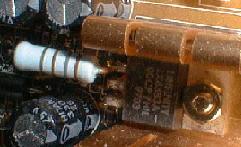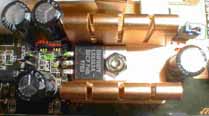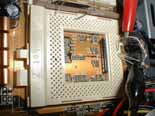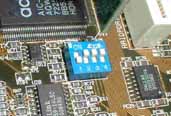Gigabyte
GA-586DX
update to AMD K6-2:
Hier vind je alle informatie
die nodig is om je GA-586DX om te bouwen tot een
Dual AMD K6 type 2. Soms gaan de performance vaak tot 80% omhoog!!! met
een K6-2 200Mhz.
Als je een 400Mhz variant er in wil gebruiken zul je of een zwaardere voltage
regelaar of 2 parallel
aan elkaar moeten zetten.
De K6 kan eigelijk geen
multiprocessing. Het moederbord zal alleen met 1 CPU willen werken.
Met deze upgrade zal je de
volgende problemen tegen komen.
- De GA-586DX ondersteunt dual
voltage CPUs (P55C) maar alleen 2.8V core voltage. De K6-2
heeft alleen een core voltage van 2.2V nodig
- Het moederbord heeft geen BF2
Jumper om een clock multiplier van meer dan X 3.5.
- De nieuwste BIOS
ondersteunt K6, maar detect de K6-2 niet.
 The
DX-Board has an autoamtic Dual-Voltage recognition. But it works only with 2.8V
CPUs reliable. You can the put in the JP2 Jumper, or, even simplier, put in a
bridge between Pin 1 and 2 of the Jumper. (Who wants to use 3.3V CPUs in these
days) To get the 2.2 Volt core-voltage, you have to use a resistor of about 180
Ohm between pin 1 of the voltage regulator and ground ( Gnd-Pin of the cooler).
This gives together with the parallel R32 (182 Ohm) and R148 (422 Ohm) a
Regulator R1 of about 75 Ohm. Together with the resistor between pin 1 and 2
R33=100 Ohm you get the 2.2 Volt with the formula (75/100+1)*1.25 = 2.2V
The
DX-Board has an autoamtic Dual-Voltage recognition. But it works only with 2.8V
CPUs reliable. You can the put in the JP2 Jumper, or, even simplier, put in a
bridge between Pin 1 and 2 of the Jumper. (Who wants to use 3.3V CPUs in these
days) To get the 2.2 Volt core-voltage, you have to use a resistor of about 180
Ohm between pin 1 of the voltage regulator and ground ( Gnd-Pin of the cooler).
This gives together with the parallel R32 (182 Ohm) and R148 (422 Ohm) a
Regulator R1 of about 75 Ohm. Together with the resistor between pin 1 and 2
R33=100 Ohm you get the 2.2 Volt with the formula (75/100+1)*1.25 = 2.2V


The changes you have to do are marked green in the picture. red marks are for
information only.
Measuring of the voltages:
 If
you use a load resitor of 100 Ohm between B16 and A17 in the CPU-Socket (in the
pic to the upper right), you can measure the core voltage of 2.2V. At the
resistor between B18 and A19 (lower right) one can measure the 3.3V supply
voltage. (Don't regard the red and black in the picture, you measure between the
ends of your resistor, of course). The third 100 Ohm resistor in the upper left
is for switching to dual voltage.
If
you use a load resitor of 100 Ohm between B16 and A17 in the CPU-Socket (in the
pic to the upper right), you can measure the core voltage of 2.2V. At the
resistor between B18 and A19 (lower right) one can measure the 3.3V supply
voltage. (Don't regard the red and black in the picture, you measure between the
ends of your resistor, of course). The third 100 Ohm resistor in the upper left
is for switching to dual voltage.
CAUTION: before power on
close the Socket! The voltage regulators should not be used without load (empty
socket)!
The core voltage can be
measured between pin 2 (or the housing of the VR) and ground.
The LX8383A on the GA-586DX is
specified for 7.5A. This is normally enough for the K6-2. Peak-loads of up to
8.45A can be done with good cooling. If you get stability problems anyhow, you
can use an LT1083CP (about 15 Euro) instead of the LX8383A and/or use an
additional CPU-cooler for the voltage regulator.
Solution for Problem 2 (BF2
Jumper missing)
| Bus frequency (66MHz) |
| CPU [MHz] |
factor |
BF0 |
BF1 |
BF2 |
| 233 |
3.5 |
1 |
1 |
1 |
| 133 |
2.0 |
0 |
1 |
1 |
| 200 |
3.0 |
1 |
0 |
1 |
| 166 |
2.5 |
0 |
0 |
1 |
| 366 |
5.5 |
1 |
1 |
0 |
| 266 |
4.0 |
0 |
1 |
0 |
| 333 |
5.0 |
1 |
0 |
0 |
| 300 |
4.5 |
0 |
0 |
0 |

The K6-2 300 is operated with
the factor 4.5 (4.5x66=300) in 66Mhz Boards. As there is no BF2-Jumper on the
DX-Board, you can use a little piece of loudspeacer cable between W35 and V36 in
the CPU-Socket. Since you can use only one CPU, you can put the cable link in
the other one.
 You can put W35 to ground
instead, if you don't like small wires on your board. BF0 and BF1 (Schalter 3+4)
are both set (see pic):
You can put W35 to ground
instead, if you don't like small wires on your board. BF0 and BF1 (Schalter 3+4)
are both set (see pic):
Newer K6-2 starting from 400
MHz interpret x2 as x6, so you don't need to change anything regarding BF2.
However, AFAIK still nobody suceeded in operating a 400MHz CPU or an K6-III with
this frequency on the DX-Board. The maximum reported frequencies are 333 or 366
MHz. The problem seems to be the BIOS.
Solution to
problem of 3 (BIOS detects no K6)
My DX board announces 486 DX60:
-) I have the board revision 3b and the newest officially BIOS available with
gigabyte (version 3.43).
 The
DX-Board has an autoamtic Dual-Voltage recognition. But it works only with 2.8V
CPUs reliable. You can the put in the JP2 Jumper, or, even simplier, put in a
bridge between Pin 1 and 2 of the Jumper. (Who wants to use 3.3V CPUs in these
days) To get the 2.2 Volt core-voltage, you have to use a resistor of about 180
Ohm between pin 1 of the voltage regulator and ground ( Gnd-Pin of the cooler).
This gives together with the parallel R32 (182 Ohm) and R148 (422 Ohm) a
Regulator R1 of about 75 Ohm. Together with the resistor between pin 1 and 2
R33=100 Ohm you get the 2.2 Volt with the formula (75/100+1)*1.25 = 2.2V
The
DX-Board has an autoamtic Dual-Voltage recognition. But it works only with 2.8V
CPUs reliable. You can the put in the JP2 Jumper, or, even simplier, put in a
bridge between Pin 1 and 2 of the Jumper. (Who wants to use 3.3V CPUs in these
days) To get the 2.2 Volt core-voltage, you have to use a resistor of about 180
Ohm between pin 1 of the voltage regulator and ground ( Gnd-Pin of the cooler).
This gives together with the parallel R32 (182 Ohm) and R148 (422 Ohm) a
Regulator R1 of about 75 Ohm. Together with the resistor between pin 1 and 2
R33=100 Ohm you get the 2.2 Volt with the formula (75/100+1)*1.25 = 2.2V

 If
you use a load resitor of 100 Ohm between B16 and A17 in the CPU-Socket (in the
pic to the upper right), you can measure the core voltage of 2.2V. At the
resistor between B18 and A19 (lower right) one can measure the 3.3V supply
voltage. (Don't regard the red and black in the picture, you measure between the
ends of your resistor, of course). The third 100 Ohm resistor in the upper left
is for switching to dual voltage.
If
you use a load resitor of 100 Ohm between B16 and A17 in the CPU-Socket (in the
pic to the upper right), you can measure the core voltage of 2.2V. At the
resistor between B18 and A19 (lower right) one can measure the 3.3V supply
voltage. (Don't regard the red and black in the picture, you measure between the
ends of your resistor, of course). The third 100 Ohm resistor in the upper left
is for switching to dual voltage.

 You can put W35 to ground
instead, if you don't like small wires on your board. BF0 and BF1 (Schalter 3+4)
are both set (see pic):
You can put W35 to ground
instead, if you don't like small wires on your board. BF0 and BF1 (Schalter 3+4)
are both set (see pic):